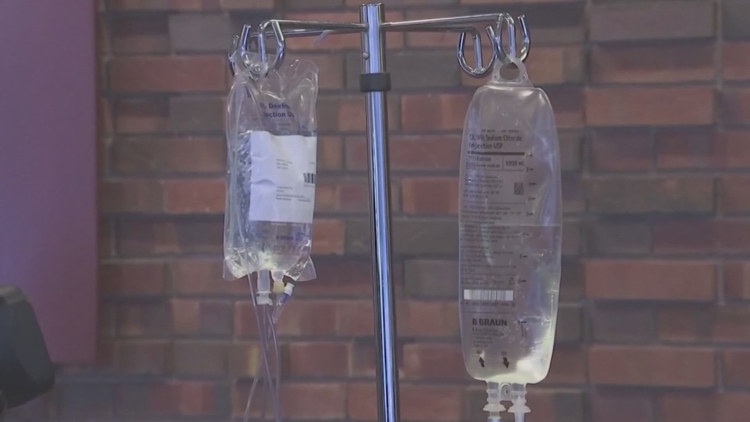SEATTLE — Hospitals in Washington state are still conserving IV fluid solution amid a supply chain disruption caused by Hurricane Helene.
Earlier this month, the Washington State Hospital Association (WSHA) said it was following national guidance in conserving IV fluids after Hurricane Helene impacted a major manufacturer on the East Coast. The Baxter facility in North Carolina supplies approximately 60%, or 1.5 million bags, of the IV solution used in hospitals every day across the country.
This week, the largest healthcare providers in around Puget Sound provided KING 5 with an update.
UW Medicine, Providence Swedish and Virginia Mason Franciscan Health all said they're conserving supplies, while monitoring the situation.
UW Medicine
"Like other hospitals, UW Medicine has been implementing conservation strategies across the health system and working hard to ensure that fluids are available to our patients," said Susan Gregg, UW Medicine spokesperson.
Providence Swedish
A spokesperson for Providence Swedish said the system is taking a variety of measures to conserve supplies, while patient care remains its highest priority. They released the following statement:
"Providence Swedish is employing various mitigation strategies to ensure there is minimal disruption to patient care, including strategies to conserve current supply and use of alternative fluids and solutions as appropriate," a statement from Providence Swedish reads.
Some of actions taken to address all critical and urgent patient care needs include may rescheduling of elective (non-urgent, non-emergent) procedures and surgeries, the hospital added, and "all steps taken to manage this shortage are in alignment with the highest quality and safest care."
Postponements vary by hospital and affected patients will be notified directly. All other patients should keep their scheduled appointments, the hospital said. The emergency department remains open for anyone who requires immediate medical attention.
Virginia Mason Franciscan Health
According to its region director for emergency management, Virginia Mason Franciscan Health is optimizing fluid management, evaluating opportunities to minimize customization of fluids shortage, using syringes with certain antibiotics and other medications, while monitoring supply chain status weekly.
"We remain dedicated to ensuring the reallocation of resources to those that need them most in collaboration with leaders across CommonSpirit Health and by supporting efforts led by the Northwest Healthcare Response Network, the Washington State Hospital Association, and other health care organizations," said Eileen Newton.
Seattle Children's Hospital
Seattle Children's and the VA of Puget Sound said they're also monitoring the situation, but are not currently impacted by the shortage.
In a statement, Seattle Children's said it uses a different supplier for most fluid products and does not anticipate the Baxter facility closure will impact services.
"Seattle Children's is in constant communication with regional and national resources and is forecasting several weeks ahead to ensure a sustainable plan to continue to provide the best care for the patients and families we serve," the statement said.
VA Puget Sound Health Care
The VA released a similar statement.
"At this time, VA has not identified any procedure cancelations as a result of this shortage. VA is closely tracking inventory, shipments, cross-leveling supply between facilities when appropriate, and following general conservation guidance to maximum use of existing supplies. We will continue to take all necessary actions to serve Veterans, maintain continuity of care, and ensure patient safety," according to press secretary Terrance Hayes.
As a result of the shortage, some hospitals have been forced to suspend all elective, nonemergency procedures, conserving IV supplies for those with life-threatening needs.
Overlake Medical Center
Leaders at Overlake Medical Center and Clinics have implemented conservation efforts that have reduced IV fluid product use by roughly 36-46%, according to a spokesperson.
Overlake has not needed to cancel any procedures due to the shortage, but continue to monitor stock daily and look for alternative suppliers, both domestically and internationally, until the Baxter plant is fully operational.



